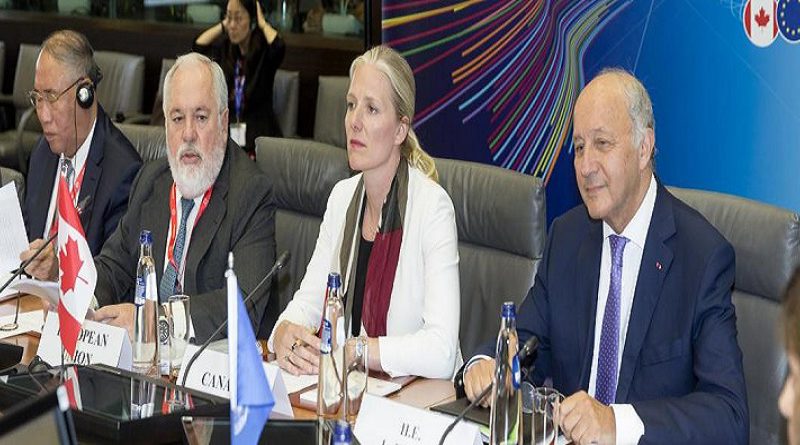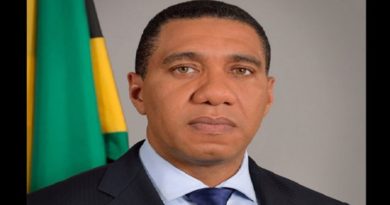Political leaders urge more climate action, strong outcome in Katowice
Political leaders from all regions are multiplying their public calls for nations to step up immediate climate action and to conclude robust guidelines to implement the Paris Climate Change Agreement at the next UN climate talks in Poland in December.
Last week, ministers from 36 governments from around the world met in Brussels, Belgium, where they reiterated their commitment to achieving a “balanced, comprehensive, pragmatic, robust and operational set of implementation guidance” under the Paris Agreement Work Proramme at the upcoming UN Climate Change Conference in Katowice, Poland (COP24).
At the Ministerial on Climate Action (MoCA) convened on 20-21 June by the European Union, Canada and China, ministers stressed the importance of multilateralism and confirmed that “the Paris Agreement is irreversible and it is not to be renegotiated.”
EU Climate Action and Energy Commissioner Miguel Arias Cañete, China’s Special Representative for Climate Change Xie Zhenhua and Canada’s Minister of Environment Catherine McKenna called on the world to put forward more ambitious commitments under the Paris Agreement.
In his opening remarks, Commissioner Miguel Arias Cañete said:“Last Thursday, EU negotiators agreed to increase the 2030 renewable energy target to 32% up from the original 27% target on the basis of which our at least 40% emissions reduction target in our NDC was modelled. And yesterday evening, EU negotiators agreed on a new 32,5% energy efficiency target by 2030 up from the 30% original target. Both new targets would de facto mean that the European Union would be in a position to raise the level of ambition of the NDC and increase its emissions reduction target from the current 40% to slightly over 45% by 2030.”
Catherine McKenna, Minister of Environment and Climate Change, said: “Canadians expect our government to take ambitious action to fight climate change at home and abroad. These meetings with other international climate leaders were essential to continue building momentum toward the ambitious global action we need to keep our climate safe and realise the opportunities of the transition to cleaner economic growth. We will continue to work with our national and international partners to ensure we can all meet our Paris commitments to protect our planet for our kids and grandkids.”
Xie Zhenhua, China’s Special Representative on Climate Change Affairs, said:“Our purpose is to achieve low-carbon economy and to build up a community of common destiny for human beings. In December, we are going to have COP24 and UN Secretary-General Guterres has invited us to different summits including the international summit on biodiversity [UN Biodiversity Conference]. All these summits and platforms can be supplementary to achieve our final goal which is sustainable development through synergies of political will among all countries”.
Ministers reiterated the importance of these and other gatherings —such as the upcoming Global Climate Action Summit in San Francisco and the 2019 Climate Summit hosted by the UN Secretary-General— as part of an informal process that “in no way replaces or prejudges the formal UN negotiations” but was designed to help ensure the success of the international talks under the UNFCCC process.
Sustainable Peace Needs Climate Action
Only one day after MoCA, the European Union High Representative for Foreign Affairs and Security Policy Federica Mogherini hosted a high-level event that stressed the urgency and importance of tackling the risks that climate change poses to security and peace.
Ministers from around the world, top United Nations officials, and leading experts testified to the many real and potential security threats deriving from climate change.
Ms. Mogherini said:”Here in Europe, experience tells us that peace and security are not only about peace treaties and defence budgets. Peace has to be sustainable in time. And sustainable peace requires good jobs, decent access to natural resources, and sustainable development. Sustainable peace needs climate action, so let us keep this in mind: when we invest in the fight against climate change, we invest in our own security.”
Participants called for enhanced multilateral cooperation to deal with climate and security and stressed the need to align implementation of climate and development policy on the ground.
Ovais Sarmad, UN Climate Change Deputy Executive Secretary said:“There is a clear link between the impacts of climate change and global security. Climate change acts as a threat multiplier, making many of the biggest challenges humanity faces even worse. The way forward is for the world to deliver on the promises contained in both the Paris Agreement and the UN’s Sustainable Development Goals.”
Erik Solheim, Head of UN Environment, proposed three actions to address the climate-security nexus:“First, we need to address water issues. Water management and diplomacy can help us relieve water stress and sea level rise. “We should further create a Marshall plan on solar energy. The Sahel holds an enormous opportunity for solar energy, which can help green and uplift the area. And finally, we need to assist Africa in getting urbanization right – to be sustainable and relieve stress on resources like land, food, and natural resourced.”
23 nations pledge to step up climate action
Shortly after the conclusion of the Ministerial on Climate Action, a group countries published a joint statement, called a ‘Declaration for Ambition’ pledging to “lead from the front” to reduce greenhouse gas emissions before 2020.
“We commit to exploring the possibilities for stepping up our own ambition,” says the statement that points to the upcoming UN Climate Summit, in September 2019, hosted by the UN Secretary-General, as “the biggest political opportunity” to do so.
“We commit to supporting the Secretary-General in his efforts to urgently galvanize political momentum in the lead-up to September 2019,” it says.
The signatories to the pledge were Argentina, Britain, Canada, Chile, Colombia, Costa Rica, Denmark, Ethiopia, Fiji, Finland, France, Germany, Maldives, Marshall Islands, Mexico, Monaco, the Netherlands, New Zealand, Norway, Rwanda, Saint Lucia, Spain and Sweden.
The UN Secretary-General Climate thanked the initiative saying: ” Climate change is still moving faster than we are. Thank you to the 23 countries who signed a declaration for more ambition on climate action. I am convening a climate summit next year and look forward to working with all to protect our planet”.
Calls for people-centred policy and strong outcome in Katowice
On 18 and 19 June, the Federal Environment Ministry and the Government of the Republic of Poland hosted the 9th Petersberg Climate Dialogue in Berlin. This informal meeting of ministers and representatives from 35 countries focussed on the implementation of the Paris Climate Agreement and preparation for the next UN Climate Change Conference in Katowice under Poland’s Presidency.
Germany’s Chancellor Angela Merkel stressed that “climate action is a matter of both ecological necessity and economic rationality” and Poland’s Prime Minister Mateusz Morawiecki underlined “the need to keep citizens at the centre of climate policy and the fundamental role for spurring innovation to achieve that goal”.
Ministers stressed that the global community needs to move ahead together and that strong political will and leadership is imperative to meet the scale and urgency of action needed to achieve the goal of the Paris Agreement of limiting global temperature increase to well below 2 degrees Celsius.
Petersberger Dialogue 2018
Ministers highlighted the transformative nature of the agreement and that its adoption marked a turning point for global development.
At the dialogue, the political leaders voiced the need for a robust outcome in Katowice. While recognising that negotiations were progressing on the right path, they also underlined the need to step up the pace of the talks and to make the best use of the Bangkok negotiation session in early September.
Ministers expressed their commitment to successfully completing the Paris Agreement Work Programme at COP24. They recognized that agreeing on the detailed guidelines to operationalize provisions and obligations of the Paris Agreement is a necessary condition for its effective implementation.
UN Climate Change Executive Secretary Patricia Espinosa and the chairs and co-chairs of the UNFCCC subsidiary bodies also met in Berlin.




